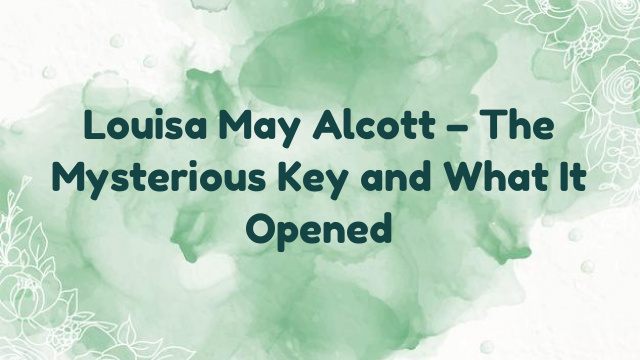
Louisa May Alcott – The Mysterious Key and What It Opened
Chapter III
In a week Paul was a favorite with the household; even prudent Hester felt the charm of his presence, and owned that Lillian was happier for a young companion in her walks. Hitherto the child had led a solitary life, with no playmates of her own age, such being the will of my lady; therefore she welcomed Paul as a new and delightful amusement, considering him her private property and soon transferring his duties from the garden to the house. Satisfied of his merits, my lady yielded to Lillian’s demands, and Paul was installed as page to the young lady. Always respectful and obedient, he never forgot his place, yet seemed unconsciously to influence all who approached him, and win the goodwill of everyone.
My lady showed unusual interest in the lad, and Lillian openly displayed her admiration for his accomplishments and her affection for her devoted young servitor. Hester was much flattered by the confidence he reposed in her, for to her alone did he tell his story, and of her alone asked advice and comfort in his various small straits. It was as she suspected: Paul was a gentleman’s son, but misfortune had robbed him of home, friends, and parents, and thrown him upon the world to shift for himself. This sad story touched the woman’s heart, and the boy’s manly spirit won respect. She had lost a son years ago, and her empty heart yearned over the motherless lad. Ashamed to confess the tender feeling, she wore her usual severe manner to him in public, but in private softened wonderfully and enjoyed the boy’s regard heartily.
“Paul, come in. I want to speak with you a moment,” said my lady, from the long window of the library to the boy who was training vines outside.
Dropping his tools and pulling off his hat, Paul obeyed, looking a little anxious, for the month of trial expired that day. Lady Trevlyn saw and answered the look with a gracious smile.
“Have no fears. You are to stay if you will, for Lillian is happy and I am satisfied with you.”
“Thank you, my lady.” And an odd glance of mingled pride and pain shone in the boy’s downcast eyes.
“That is settled, then. Now let me say what I called you in for. You spoke of being able to illuminate on parchment. Can you restore this old book for me?”
She put into his hand the ancient volume Sir Richard had been reading the day he died. It had lain neglected in a damp nook for years till my lady discovered it, and, sad as were the associations connected with it, she desired to preserve it for the sake of the weird prophecy if nothing else. Paul examined it, and as he turned it to and fro in his hands it opened at the page oftenest read by its late master. His eye kindled as he looked, and with a quick gesture he turned as if toward the light, in truth to hide the flash of triumph that passed across his face. Carefully controlling his voice, he answered in a moment, as he looked up, quite composed, “Yes, my lady, I can retouch the faded colors on these margins and darken the pale ink of the Old English text. I like the work, and will gladly do it if you like.”
“Do it, then, but be very careful of the book while in your hands. Provide what is needful, and name your own price for the work,” said his mistress.
“Nay, my lady, I am already paid—”
“How so?” she asked, surprised.
Paul had spoken hastily, and for an instant looked embarrassed, but answered with a sudden flush on his dark cheeks, “You have been kind to me, and I am glad to show my, gratitude in any way, my lady.”
“Let that pass, my boy. Do this little service for me and we will see about the recompense afterward.” And with a smile Lady Trevlyn left him to begin his work.
The moment the door closed behind her a total change passed over Paul. He shook his clenched hand after her with a gesture of menace, then tossed up the old book and caught it with an exclamation of delight, as he reopened it at the worn page and reread the inexplicable verse.
“Another proof, another proof! The work goes bravely on, Father Cosmo; and boy as I am, I’ll keep my word in spite of everything,” he muttered.
“What is that you’ll keep, lad?” said a voice behind him.
“I’ll keep my word to my lady, and do my best to restore this book, Mrs. Hester,” he answered, quickly recovering himself.
“Ah, that’s the last book poor Master read. I hid it away, but my lady found it in spite of me,” said Hester, with a doleful sigh.
“Did he die suddenly, then?” asked the boy.
“Dear heart, yes; I found him dying in this room with the ink scarce dry on the letter he left for my lady. A mysterious business and a sad one.”
“Tell me about it. I like sad stories, and I already feel as if I belonged to the family, a loyal retainer as in the old times. While you dust the books and I rub the mold off this old cover, tell me the tale, please, Mrs. Hester.”
She shook her head, but yielded to the persuasive look and tone of the boy, telling the story more fully than she intended, for she loved talking and had come to regard Paul as her own, almost.
“And the letter? What was in it?” asked the boy, as she paused at the catastrophe.
“No one ever knew but my lady.”
“She destroyed it, then?”
“I thought so, till a long time afterward, one of the lawyers came pestering me with questions, and made me ask her. She was ill at the time, but answered with a look I shall never forget, ‘No, it’s not burnt, but no one shall ever see it.’ I dared ask no more, but I fancy she has it safe somewhere and if it’s ever needed she’ll bring it out. It was only some private matters, I fancy.”
“And the stranger?”
“Oh, he vanished as oddly as he came, and has never been found. A strange story, lad. Keep silent, and let it rest.”
“No fear of my tattling,” and the boy smiled curiously to himself as he bent over the book, polishing the brassbound cover.
“What are you doing with that pretty white wax?” asked Lillian the next day, as she came upon Paul in a quiet corner of the garden and found him absorbed in some mysterious occupation.
With a quick gesture he destroyed his work, and, banishing a momentary expression of annoyance, he answered in his accustomed tone as he began to work anew, “I am molding a little deer for you, Miss Lillian. See, here is a rabbit already done, and I’ll soon have a stag also.”
“It’s very pretty! How many nice things you can do, and how kind you are to think of my liking something new. Was this wax what you went to get this morning when you rode away so early?” asked the child.
“Yes, Miss Lillian. I was ordered to exercise your pony and I made him useful as well. Would you like to try this? It’s very easy.”
Lillian was charmed, and for several days wax modeling was her favorite play. Then she tired of it, and Paul invented a new amusement, smiling his inexplicable smile as he threw away the broken toys of wax.
“You are getting pale and thin, keeping such late hours, Paul. Go to bed, boy, go to bed, and get your sleep early,” said Hester a week afterward, with a motherly air, as Paul passed her one morning.
“And how do you know I don’t go to bed?” he asked, wheeling about.
“My lady has been restless lately, and I sit up with her till she sleeps. As I go to my room, I see your lamp burning, and last night I got as far as your door, meaning to speak to you, but didn’t, thinking you’d take it amiss. But really you are the worse for late hours, child.”
“I shall soon finish restoring the book, and then I’ll sleep. I hope I don’t disturb you. I have to grind my colors, and often make more noise than I mean to.”
Paul fixed his eyes sharply on the woman as he spoke, but she seemed unconscious of it, and turned to go on, saying indifferently, “Oh, that’s the odd sound, is it? No, it doesn’t trouble me, so grind away, and make an end of it as soon as may be.”
An anxious fold in the boy’s forehead smoothed itself away as he left her, saying to himself with a sigh of relief, “A narrow escape; it’s well I keep the door locked.”
The boy’s light burned no more after that, and Hester was content till a new worry came to trouble her. On her way to her room late one night, she saw a tall shadow flit down one of the side corridors that branched from the main one. For a moment she was startled, but, being a woman of courage, she followed noiselessly, till the shadow seemed to vanish in the gloom of the great hall.
“If the house ever owned a ghost I’d say that’s it, but it never did, so I suspect some deviltry. I’ll step to Paul. He’s not asleep, I dare say. He’s a brave and a sensible lad, and with him I’ll quietly search the house.”
Away she went, more nervous than she would own, and tapped at the boy’s door. No one answered, and, seeing that it was ajar, Hester whisked in so hurriedly that her candle went out. With an impatient exclamation at her carelessness she glided to the bed, drew the curtain, and put forth her hand to touch the sleeper. The bed was empty. A disagreeable thrill shot through her, as she assured herself of the fact by groping along the narrow bed. Standing in the shadow of the curtain, she stared about the dusky room, in which objects were visible by the light of a new moon.
“Lord bless me, what is the boy about! I do believe it was him I saw in the—” She got no further in her mental exclamation for the sound of light approaching footsteps neared her. Slipping around the bed she waited in the shadow, and a moment after Paul appeared, looking pale and ghostly, with dark, disheveled hair, wide-open eyes, and a cloak thrown over his shoulders. Without a pause he flung it off, laid himself in bed, and seemed to sleep at once.
“Paul! Paul!” whispered Hester, shaking him, after a pause of astonishment at the whole proceeding.
“Hey, what is it?” And he sat up, looking drowsily about him.
“Come, come, no tricks, boy. What are you doing, trailing about the house at this hour and in such trim?”
“Why, Hester, is it you?” he exclaimed with a laugh, as he shook off her grip and looked up at her in surprise.
“Yes, and well it is me. If it had been any of those silly girls, the house would have been roused by this time. What mischief is afoot that you leave your bed and play ghost in this wild fashion?”
“Leave my bed! Why, my good soul, I haven’t stirred, but have been dreaming with all my might these two hours. What do you mean, Hester?”
She told him as she relit her lamp, and stood eyeing him sharply the while. When she finished he was silent a minute, then said, looking half vexed and half ashamed, “I see how it is, and I’m glad you alone have found me out. I walk in my sleep sometimes, Hester, that’s the truth. I thought I’d got over it, but it’s come back, you see, and I’m sorry for it. Don’t be troubled. I never do any mischief or come to any harm. I just take a quiet promenade and march back to bed again. Did I frighten you?”
“Just a trifle, but it’s nothing. Poor lad, you’ll have to have a bedfellow or be locked up; it’s dangerous to go roaming about in this way,” said Hester anxiously.
“It won’t last long, for I’ll get more tired and then I shall sleep sounder. Don’t tell anyone, please, else they’ll laugh at me, and that’s not pleasant. I don’t mind your knowing for you seem almost like a mother, and I thank you for it with all my heart.”
He held out his hand with the look that was irresistible to Hester. Remembering only that he was a motherless boy, she stroked the curly hair off his forehead, and kissed him, with the thought of her own son warm at her heart.
“Good night, dear. I’ll say nothing, but give you something that will ensure quiet sleep hereafter.”
With that she left him, but would have been annoyed could she have seen the convulsion of boyish merriment which took possession of him when alone, for he laughed till the tears ran down his cheeks.
Chapter IV
He’s a handsome lad, and one any woman might be proud to call her son,” said Hester to Bedford, the stately butler, as they lingered at the hall door one autumn morning to watch their young lady’s departure on her daily ride.
“You are right, Mrs. Hester, he’s a fine lad, and yet he seems above his place, though he does look the very picture of a lady’s groom,” replied Bedford approvingly.
So he did, as he stood holding the white pony of his little mistress, for the boy gave an air to whatever he wore and looked like a gentleman even in his livery. The dark-blue coat with silver buttons, the silver band about his hat, his white-topped boots and bright spurs, spotless gloves, and tightly drawn belt were all in perfect order, all becoming, and his handsome, dark face caused many a susceptible maid to blush and simper as they passed him. “Gentleman Paul,” as the servants called him, was rather lofty and reserved among his mates, but they liked him nonetheless, for Hester had dropped hints of his story and quite a little romance had sprung up about him. He stood leaning against the docile creature, sunk in thought, and quite unconscious of the watchers and whisperers close by. But as Lillian appeared he woke up, attended to his duties like a well-trained groom, and lingered over his task as if he liked it. Down the avenue he rode behind her, but as they turned into a shady lane Lillian beckoned, saying, in the imperious tone habitual to her, “Ride near me. I wish to talk.”
Paul obeyed, and amused her with the chat she liked till they reached a hazel copse; here he drew rein, and, leaping down, gathered a handful of ripe nuts for her.
“How nice. Let us rest a minute here, and while I eat a few, please pull some of those flowers for Mamma. She likes a wild nosegay better than any I can bring her from the garden.”
Lillian ate her nuts till Paul came to her with a hatful of late flowers and, standing by her, held the impromptu basket while she made up a bouquet to suit her taste.
“You shall have a posy, too; I like you to wear one in your buttonhole as the ladies’ grooms do in the Park,” said the child, settling a scarlet poppy in the blue coat.
“Thanks, Miss Lillian, I’ll wear your colors with all my heart, especially today, for it is my birthday.” And Paul looked up at the blooming little face with unusual softness in his keen blue eyes.
“Is it? Why, then, you’re seventeen; almost a man, aren’t you?”
“Yes, thank heaven,” muttered the boy, half to himself.
“I wish I was as old. I shan’t be in my teens till autumn. I must give you something, Paul, because I like you very much, and you are always doing kind things for me. What shall it be?” And the child held out her hand with a cordial look and gesture that touched the boy.
With one of the foreign fashions which sometimes appeared when he forgot himself, he kissed the small hand, saying impulsively, “My dear little mistress, I want nothing but your goodwill—and your forgiveness,” he added, under his breath.
“You have that already, Paul, and I shall find something to add to it. But what is that?” And she laid hold of a little locket which had slipped into sight as Paul bent forward in his salute.
He thrust it back, coloring so deeply that the child observed it, and exclaimed, with a mischievous laugh, “It is your sweetheart, Paul. I heard Bessy, my maid, tell Hester she was sure you had one because you took no notice of them. Let me see it. Is she pretty?”
“Very pretty,” answered the boy, without showing the picture.
“Do you like her very much?” questioned Lillian, getting interested in the little romance.
“Very much,” and Paul’s black eyelashes fell.
“Would you die for her, as they say in the old songs?” asked the girl, melodramatically.
“Yes, Miss Lillian, or live for her, which is harder.”
“Dear me, how very nice it must be to have anyone care for one so much,” said the child innocently. “I wonder if anybody ever will for me?”
“Love comes to all soon or late,
And maketh gay or sad;
For every bird will find its mate,
And every lass a lad,"
sang Paul, quoting one of Hester’s songs, and looking relieved that Lillian’s thoughts had strayed from him. But he was mistaken.
“Shall you marry this sweetheart of yours someday?” asked Lillian, turning to him with a curious yet wistful look.
“Perhaps.”
“You look as if there was no ‘perhaps’ about it,” said the child, quick to read the kindling of the eye and the change in the voice that accompanied the boy’s reply.
“She is very young and I must wait, and while I wait many things may happen to part us.”
“Is she a lady?”
“Yes, a wellborn, lovely little lady, and I’ll marry her if I live.” Paul spoke with a look of decision, and a proud lift of the head that contrasted curiously with the badge of servitude he wore.
Lillian felt this, and asked, with a sudden shyness coming over her, “But you are a gentleman, and so no one will mind even if you are not rich.”
“How do you know what I am?” he asked quickly.
“I heard Hester tell the housekeeper that you were not what you seemed, and one day she hoped you’d get your right place again. I asked Mamma about it, and she said she would not let me be with you so much if you were not a fit companion for me. I was not to speak of it, but she means to be your friend and help you by-and-by.”
“Does she?”
And the boy laughed an odd, short laugh that jarred on Lillian’s ear and made her say reprovingly, “You are proud, I know, but you’ll let us help you because we like to do it, and I have no brother to share my money with.”
“Would you like one, or a sister?” asked Paul, looking straight into her face with his piercing eyes.
“Yes, indeed! I long for someone to be with me and love me, as Mamma can’t.”
“Would you be willing to share everything with another person—perhaps have to give them a great many things you like and now have all to yourself?”
“I think I should. I’m selfish, I know, because everyone pets and spoils me, but if I loved a person dearly I’d give up anything to them. Indeed I would, Paul, pray believe me.”
She spoke earnestly, and leaned on his shoulder as if to enforce her words. The boy’s arm stole around the little figure in the saddle, and a beautiful bright smile broke over his face as he answered warmly, “I do believe it, dear, and it makes me happy to hear you say so. Don’t be afraid, I’m your equal, but I’ll not forget that you are my little mistress till I can change from groom to gentleman.”
He added the last sentence as he withdrew his arm, for Lillian had shrunk a little and blushed with surprise, not anger, at this first breach of respect on the part of her companion. Both were silent for a moment, Paul looking down and Lillian busy with her nosegay. She spoke first, assuming an air of satisfaction as she surveyed her work.
“That will please Mamma, I’m sure, and make her quite forget my naughty prank of yesterday. Do you know I offended her dreadfully by peeping into the gold case she wears on her neck? She was asleep and I was sitting by her. In her sleep she pulled it out and said something about a letter and Papa. I wanted to see Papa’s face, for I never did, because the big picture of him is gone from the gallery where the others are, so I peeped into the case when she let it drop and was so disappointed to find nothing but a key.”
“A key! What sort of a key?” cried Paul in an eager tone.
“Oh, a little silver one like the key of my piano, or the black cabinet. She woke and was very angry to find me meddling.”
“What did it belong to?” asked Paul.
“Her treasure box, she said, but I don’t know where or what that is, and I dare not ask any more, for she forbade my speaking to her about it. Poor Mamma! I’m always troubling her in some way or other.”
With a penitent sigh, Lillian tied up her flowers and handed them to Paul to carry. As she did so, the change in his face struck her.
“How grim and old you look,” she exclaimed. “Have I said anything that troubles you?”
“No, Miss Lillian. I’m only thinking.”
“Then I wish you wouldn’t think, for you get a great wrinkle in your forehead, your eyes grow almost black, and your mouth looks fierce. You are a very odd person, Paul; one minute as gay as any boy, and the next as grave and stern as a man with a deal of work to do.”
“I have got a deal of work to do, so no wonder I look old and grim.”
“What work, Paul?”
“To make my fortune and win my lady.”
When Paul spoke in that tone and wore that look, Lillian felt as if they had changed places, and he was the master and she the servant. She wondered over this in her childish mind, but proud and willful as she was, she liked it, and obeyed him with unusual meekness when he suggested that it was time to return. As he rode silently beside her, she stole covert glances at him from under her wide hat brim, and studied his unconscious face as she had never done before. His lips moved now and then but uttered no audible sound, his black brows were knit, and once his hand went to his breast as if he thought of the little sweetheart whose picture lay there.
He’s got a trouble. I wish he’d tell me and let me help him if I can. I’ll make him show me that miniature someday, for I’m interested in that girl, thought Lillian with a pensive sigh.
As he held his hand for her little foot in dismounting her at the hall door, Paul seemed to have shaken off his grave mood, for he looked up and smiled at her with his blithest expression. But Lillian appeared to be the thoughtful one now and with an air of dignity, very pretty and becoming, thanked her young squire in a stately manner and swept into the house, looking tall and womanly in her flowing skirts.
Paul laughed as he glanced after her and, flinging himself onto his horse, rode away to the stables at a reckless pace, as if to work off some emotion for which he could find no other vent.
“Here’s a letter for you, lad, all the way from some place in Italy. Who do you know there?” said Bedford, as the boy came back.
With a hasty “Thank you,” Paul caught the letter and darted away to his own room, there to tear it open and, after reading a single line, to drop into a chair as if he had received a sudden blow. Growing paler and paler he read on, and when the letter fell from his hands he exclaimed, in a tone of despair, “How could he die at such a time!”
For an hour the boy sat thinking intently, with locked door, curtained window, and several papers strewn before him. Letters, memoranda, plans, drawings, and bits of parchment, all of which he took from a small locked portfolio always worn about him. Over these he pored with a face in which hope, despondency, resolve, and regret alternated rapidly. Taking the locket out he examined a ring which lay in one side, and the childish face which smiled on him from the other. His eyes filled as he locked and put it by, saying tenderly, “Dear little heart! I’ll not forget or desert her whatever happens. Time must help me, and to time I must leave my work. One more attempt and then I’m off.”
“I’ll go to bed now, Hester; but while you get my things ready I’ll take a turn in the corridor. The air will refresh me.”
As she spoke, Lady Trevlyn drew her wrapper about her and paced softly down the long hall lighted only by fitful gleams of moonlight and the ruddy glow of the fire. At the far end was the state chamber, never used now, and never visited except by Hester, who occasionally went in to dust and air it, and my lady, who always passed the anniversary of Sir Richard’s death alone there. The gallery was very dark, and she seldom went farther than the last window in her restless walks, but as she now approached she was startled to see a streak of yellow light under the door. She kept the key herself and neither she nor Hester had been there that day. A cold shiver passed over her for, as she looked, the shadow of a foot darkened the light for a moment and vanished as if someone had noiselessly passed. Obeying a sudden impulse, my lady sprang forward and tried to open the door. It was locked, but as her hand turned the silver knob a sound as if a drawer softly closed met her ear. She stooped to the keyhole but it was dark, a key evidently being in the lock. She drew back and flew to her room, snatched the key from her dressing table, and, bidding Hester follow, returned to the hall.
“What is it, my lady?” cried the woman, alarmed at the agitation of her mistress.
“A light, a sound, a shadow in the state chamber. Come quick!” cried Lady Trevlyn, adding, as she pointed to the door, “There, there, the light shines underneath. Do you see it?”
“No, my lady, it’s dark,” returned Hester.
It was, but never pausing my lady thrust in the key, and to her surprise it turned, the door flew open, and the dim, still room was before them. Hester boldly entered, and while her mistress slowly followed, she searched the room, looking behind the tall screen by the hearth, up the wide chimney, in the great wardrobe, and under the ebony cabinet, where all the relics of Sir Richard were kept. Nothing appeared, not even a mouse, and Hester turned to my lady with an air of relief. But her mistress pointed to the bed shrouded in dark velvet hangings, and whispered breathlessly, “You forgot to look there.”
Hester had not forgotten, but in spite of her courage and good sense she shrank a little from looking at the spot where she had last seen her master’s dead face. She believed the light and sound to be phantoms of my lady’s distempered fancy, and searched merely to satisfy her. The mystery of Sir Richard’s death still haunted the minds of all who remembered it, and even Hester felt a superstitious dread of that room. With a nervous laugh she looked under the bed and, drawing back the heavy curtains, said soothingly, “You see, my lady, there’s nothing there.”
But the words died on her lips, for, as the pale glimmer of the candle pierced the gloom of that funeral couch, both saw a face upon the pillow: a pale face framed in dark hair and beard, with closed eyes and the stony look the dead wear. A loud, long shriek that roused the house broke from Lady Trevlyn as she fell senseless at the bedside, and dropping both curtain and candle Hester caught up her mistress and fled from the haunted room, locking the door behind her.
In a moment a dozen servants were about them, and into their astonished ears Hester poured her story while vainly trying to restore her lady. Great was the dismay and intense the unwillingness of anyone to obey when Hester ordered the men to search the room again, for she was the first to regain her self-possession.
“Where’s Paul? He’s the heart of a man, boy though he is,” she said angrily as the men hung back.
“He’s not here. Lord! Maybe it was him a-playing tricks, though it ain’t like him,” cried Bessy, Lillian’s little maid.
“No, it can’t be him, for I locked him in myself. He walks in his sleep sometimes, and I was afraid he’d startle my lady. Let him sleep; this would only excite him and set him to marching again. Follow me, Bedford and James, I’m not afraid of ghosts or rogues.”
With a face that belied her words Hester led the way to the awful room, and flinging back the curtain resolutely looked in. The bed was empty, but on the pillow was plainly visible the mark of a head and a single scarlet stain, as of blood. At that sight Hester turned pale and caught the butler’s arm, whispering with a shudder, “Do you remember the night we put him in his coffin, the drop of blood that fell from his white lips? Sir Richard has been here.”
“Good Lord, ma’am, don’t say that! We can never rest in our beds if such things are to happen,” gasped Bedford, backing to the door.
“It’s no use to look, we’ve found all we shall find so go your ways and tell no one of this,” said the woman in a gloomy tone, and, having assured herself that the windows were fast, Hester locked the room and ordered everyone but Bedford and the housekeeper to bed. “Do you sit outside my lady’s door till morning,” she said to the butler, “and you, Mrs. Price, help me to tend my poor lady, for if I’m not mistaken this night’s work will bring on the old trouble.”
Morning came, and with it a new alarm; for, though his door was fast locked and no foothold for even a sparrow outside the window, Paul’s room was empty, and the boy nowhere to be found.




